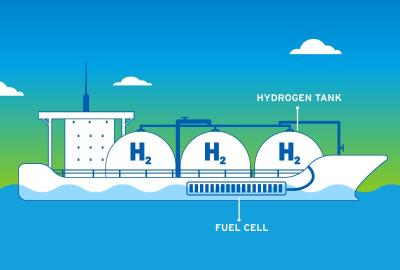Hydrogen fuel cells are a promising technological innovation that is leading the way to new innovations in sustainable energy. Shipping accounts for roughly 11% of all CO2 emissions in the transportation sector and also bears the overwhelming responsibility of 90% of international trade, the weight of which became abundantly clear in the wake of the COVID-19 pandemic. With an increased emphasis on climate urgency in the global consciousness, converting fleets to a hydrogen-based fuel system is a promising solution for the growing demand for climate regulations.
Hydrogen is a versatile and clean-burning fuel that can be produced from a variety of renewable energy sources, such as solar, hydroelectric, and even nuclear power. Not only is it a common, naturally occurring element but hydrogen itself is a byproduct of much of our existing energy infrastructure. Unlike fossil fuels, hydrogen produces no harmful emissions when burned – it only emits water vapor and heat. This makes hydrogen ideal for use in the marine industry, where reducing emissions is becoming increasingly important. The marine industry is already taking steps to reduce its emissions with new regulations set to come into force in the coming years.
Global Fleet Conversion Incentives
The International Maritime Organization, the UN agency responsible for regulating the shipping industry, has set targets to reduce greenhouse gas emissions from ships by at least 50% by 2050, compared to 2008 levels. AMOT anticipates hydrogen fuel technology will play a key role in achieving these targets. The scalability that hydrogen fuel technology offers is a major advantage compared to other fuel sources. Large-scale hydrogen production and distribution infrastructure are already being developed in some regions and with the development of hydrogen-powered ships, the technology could be integrated into the existing marine infrastructure. Hydrogen fuel cells can also be used in combination with other renewable energy technologies, such as wind turbines and solar panels, to provide a reliable and sustainable power source for ships and vessels.
Financial Benefits of Hydrogen-Powered Shipping
Hydrogen fuel cells also offer significant, long-term cost savings for the marine industry. While the initial costs of converting to hydrogen fuel technology may be high, the ongoing costs of fuel and maintenance will be significantly lower than fossil fuels. Plus, the ability to produce hydrogen from renewable energy sources means that fuel costs could become more stable and less prone to fluctuations in the oil market. The benefits of hydrogen fuel technology for the industry are clear. With continued investment and collaboration, the marine industry could lead the way in the development and adoption of hydrogen fuel cells, helping to reduce global emissions and creating a more sustainable future.
The Biggest Obstacle:
Infrastructure Development Despite the potential benefits of hydrogen fuel technology, some challenges need to be addressed. Namely, the development of the necessary infrastructure for large-scale hydrogen production and distribution. This will require significant investment and collaboration between governments, industry, and academia.
How AMOT Optimizes Fuel Cell Output
Hydrogen fuel cells must maintain a specific temperature to maximize their efficiency. If the fuel cell exceeds the threshold, system optimization decreases. AMOT is a leading provider and manufacturer of temperature control valves. A TCV will automatically adjust to keep the fuel cell operating at optimum temperatures, maximizing the fuel cell’s energy production. AMOT also supplies solutions to the anode and the cathode flow applications by using our long and unrivaled experience in air shut-off valve technology and fuel gas control applications to safely run and stop engines and fuel cells in all conditions.
Interested in optimizing your fuel cell output? Submit the form below to connect with our hydrogen experts.
Learn more about our hydrogen offerings here >>










